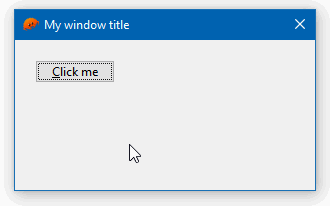WinSafe
Windows API and GUI in safe, idiomatic Rust.
WinSafe has:
- low-level Win32 API constants, functions and structs;
- high-level structs to build native Win32 GUI applications.
If you're looking for a comprehensive Win32 coverage, take a look at winapi or windows crates, which are unsafe, but have everything.
WinSafe documentation:
| Branch | Docs |
|---|---|
| Stable | docs.rs/winsafe |
| Nightly (master) | rodrigocfd.github.io/winsafe/winsafe |
Current status
These are the estimated progresses of the GUI features:
| GUI feature | Estimated progress |
|---|---|
| User window/dialogs (main, modal and control) | 100% |
| Native controls | 85% |
Plus, below are the numbers of native FFI items implemented:
| Native FFI item | Count |
|---|---|
| Functions | 555 |
| Structs | 153 |
| Constants | 11,877 |
| Window messages | 630 |
| Handles | 36 |
| COM interfaces | 36 |
| COM methods | 172 |
Usage
Add the dependency in your Cargo.toml:
[]
= { = "0.0.12", = [] }
You can, alternatively, use the Nightly (master) branch directly, to get the latest features right away:
[]
= { = "https://github.com/rodrigocfd/winsafe", = [] }
Then you must enable the Cargo features you want to be included – these modules are named after native Windows DLL and library names, mostly.
The following Cargo features are available so far:
| Feature | Description |
|---|---|
advapi |
Advapi32.dll, for Windows Registry |
comctl |
ComCtl32.dll, for Common Controls |
comdlg |
ComDlg32.dll, for the old Common Dialogs |
dshow |
DirectShow |
gdi |
Gdi32.dll, the Windows GDI |
gui |
The WinSafe high-level GUI abstractions |
kernel |
Kernel32.dll, all others will include it |
ktm |
Ktmw32.dll, the Kernel Transaction Manager |
msimg |
Msimg32.dll |
ole |
OLE and basic COM support |
oleaut |
OLE Automation |
shell |
Shell32.dll and Shlwapi.dll, the COM-based Windows Shell |
user |
User32.dll, the basic Windows GUI support |
uxtheme |
UxTheme.dll, extended window theming |
version |
Version.dll, to manipulate *.exe version info |
Note that a Cargo feature may depend on other features, which will be enabled automatically.
Example
Note: You can find several examples in the dedicated repo: github.com/rodrigocfd/winsafe-examples
WinSafe allows you to create windows in two ways:
- programmatically defining parameters; or
- loading dialogs from a
.resfile created with a WYSIWYG resource editor.
The example below creates a window with a button programmatically. Note how the click event is handled with a closure:

[]
= { = "0.0.12", = ["gui"] }
use *;
use ;
License
Licensed under MIT license, see LICENSE.md for details.

